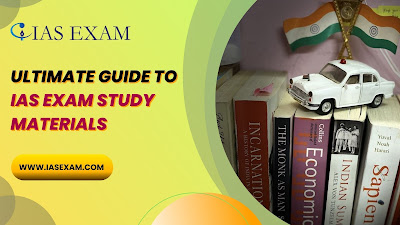Cracking the
IAS exam is not just about hard work but also about smart work, which starts
with a well-structured study plan. A carefully designed
study plan is essential for efficient IAS exam preparation because it ensures
comprehensive coverage of the syllabus including UPSC Current
Affairs, optimizes time
management, and reduces the chances of burnout. With the right
strategy in place, aspirants can confidently approach their studies, making the
challenging journey of becoming an IAS officer more manageable.
Iasexam.com
emphasizes the significance of a study plan tailored to the individual needs of
each aspirant. This plan should consider factors such as personal strengths and
weaknesses, daily schedules, and long-term goals. Let's explore the importance
of a study plan and how to craft one that maximizes your chances of success in
the IAS examination.
Why a Study
Plan is Crucial for IAS Exam Preparation?
Ensures
Comprehensive Coverage of the Syllabus
The IAS exam syllabus is vast and can be overwhelming without a structured
approach. A study plan helps in breaking down the syllabus into manageable
sections, ensuring that no topic is left uncovered. This systematic approach
allows candidates to cover all important areas without feeling rushed or
stressed.
Optimizes
Time Management
With the extensive syllabus and the need to balance multiple subjects,
effective time management becomes crucial. A well-thought-out study plan
allocates time wisely, ensuring that each subject gets the attention it
deserves. This also includes time for revision, which is essential for
retaining information and performing well in the exam.
Reduces
the Risk of Burnout
The journey to cracking the IAS exam is long and demanding. A study plan that
includes regular breaks, balanced study hours, and time for relaxation helps in
maintaining a healthy study routine. This reduces the risk of burnout, keeping
you motivated and focused throughout your preparation period.
How to Create
an Effective Study Plan for IAS Exam Preparation?
Understand
the Exam Pattern and Syllabus
Before diving into preparation, it’s crucial to understand the IAS exam pattern
and syllabus. This will help you identify key areas that require more focus and
prioritize your studies accordingly. Break down the syllabus into smaller parts
and create a timeline to cover each topic comprehensively.
Set
Clear Goals and Milestones
Start by setting clear, achievable goals. These could be daily, weekly, or
monthly targets. Milestones help in tracking progress and staying motivated.
For example, aim to complete a certain number of topics by the end of each
week. Use these goals to measure your progress and adjust your study plan as
needed.
Prioritize
Based on Strengths and Weaknesses
Everyone has strengths and weaknesses. A personalized study plan should focus
more on weaker areas while still reinforcing your strengths. Allocate more time
to subjects or topics where you need improvement, and use your strong points to
build confidence and maintain momentum.
Balancing
Multiple Subjects in IAS Preparation
Daily
Subject Rotation
Instead of dedicating entire days to a single subject, rotate subjects daily.
This helps in keeping your mind fresh and engaged. For example, you can start
your day with a heavy subject like General Studies, followed by a lighter
subject like Essay writing in the afternoon, and end with optional subjects in
the evening.
Integrate
Revision and Practice
Revision is as important as learning new topics. Incorporate regular revision
sessions into your study plan. Additionally, practicing previous years’
question papers and taking mock tests should be an integral part of your
preparation. This will help in assessing your preparation level and identifying
areas that need more focus.
Stay
Updated with Current Affairs
Current affairs play a significant role in the IAS exam, especially in the
General Studies paper. Dedicate time daily to reading newspapers, practicing daily current
affairs for UPSC, following reliable news sources, and making notes on
important events. This will not only help in the exam but also in developing a
well-rounded perspective on various issues.
Importance of
Flexibility and Regular Assessment
Be
Flexible with Your Study Plan
While it’s important to stick to a study plan, flexibility is key to
accommodating unexpected events or changes in your daily routine. Adjust your
plan as needed without losing sight of your goals. This flexibility also helps
in managing stress and maintaining a positive attitude toward your preparation.
Regular
Self-Assessment
Regular assessment through mock tests and self-evaluation is crucial in
tracking your progress. This helps in identifying weaknesses early on, allowing
you to adjust your study plan accordingly. It also builds exam temperament and
boosts confidence, which are essential for success.
Leveraging
Iasexam.com Resources
Utilize
Quality Study Material and Resources
Iasexam.com offers a plethora of resources, including study material, current
affairs updates, and mock tests, which can be integrated into your study plan.
Utilize these resources to stay on track and ensure that you are covering the
syllabus comprehensively.
Join
Study Groups and Discussion Forums
Being part of a community of IAS aspirants can be highly beneficial. Engage in
discussions, share resources, and seek advice from peers and experts. This
collaborative approach can provide new insights, clarify doubts, and keep you
motivated.
Conclusion:
The Road to Success
A well-structured study plan is
the backbone of successful IAS exam preparation. It ensures
that you stay organized, cover the syllabus comprehensively, and manage your
time effectively. By incorporating flexibility, regular assessment, and
utilizing resources like Iasexam.com,
you can enhance your preparation, be versed with IAS
Current Affairs and move closer to achieving your goal of becoming an
IAS officer. Remember, consistency and determination, combined with a smart
study plan, are the keys to cracking the IAS exam.


.png)






